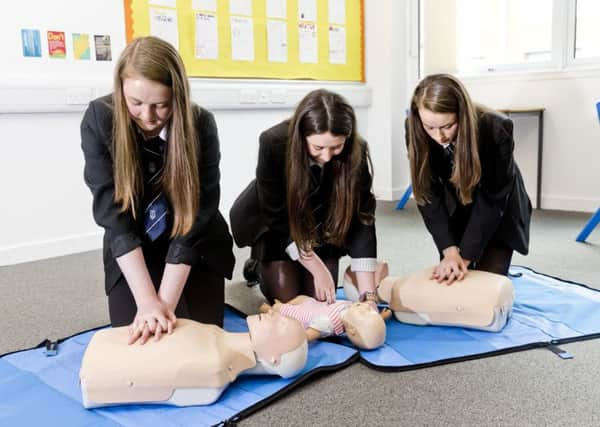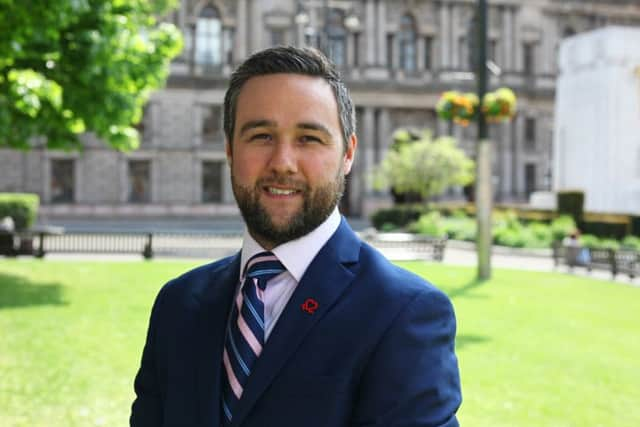David McColgan: Lessen the heart-break by learning the lesson of life-saving CPR


A cardiac arrest is not a heart attack. It happens when the heart suddenly stops pumping blood around the body, usually because of a problem with electrical signals in the heart.
When someone has a cardiac arrest, their chance of survival is quite simply a race against the clock. Every second counts. And in Scotland, only one in twelve people who suffer a cardiac arrest outside of hospital will survive. That figure is far too low, and that’s something that all of us at BHF Scotland are absolutely committed to tackling, as part of our commitment to the Save a Life for Scotland initiative.
Advertisement
Hide AdAdvertisement
Hide AdOur aim is to give someone who’s had a cardiac arrest the best chance of survival, and the best way of doing that is to make sure more people have been equipped with life saving CPR skills. That’s why we’ve made it a priority over the last few months to meet with councils across Scotland and talk to them about the critical importance of making sure that all pupils in local authority schools are taught CPR before they leave.


Until this summer, there was no systematic and sustainable approach taken to provide this training by any local authority or education authority across the UK. That changed in June, when Scotland’s largest local authority, Glasgow City Council, publicly committed to developing a delivery method to ensure that, at an appropriate stage in the curriculum, all secondary pupils receive CPR training.
There’s been some excellent progress since then, with another nine councils so far pledging to teach these essential skills in their schools. But that means that there are still 22 council areas where that commitment hasn’t been made.
We really don’t want to end up in a situation where learning CPR could become a postcode lottery. In some areas, all secondary school pupils will be learning these life saving skills, but in too many others, CPR isn’t available. And we don’t think that’s how it should be.
At the moment, around two-thirds of schools in Scotland are equipped by the BHF to teach CPR, either through our Heartstart scheme or by registering for one of our ‘Call Push Rescue’ kits. The kits are free and contain all the specialist equipment needed for the training, so there’s no cost involved for the school or the local authority.
We know from our own surveys of attitudes to CPR that most people in Scotland think it should be taught in school, and the international evidence supports that position.
In Denmark, for example, after the decision in 2005 to make CPR mandatory in schools, survival rates from out-of-hospital cardiac arrest tripled, with one in four people now surviving.
The Scottish Government introduced a pioneering new Out-of-Hospital Cardiac Arrest strategy for Scotland in 2015, covering the five years to 2020. In partnership with the Scottish Fire & Rescue Service, the Scottish Ambulance Service, voluntary organisations and others as part of Save a Life for Scotland, we’ve been working to deliver that strategy and its objective of equipping an additional 500,000 people with CPR skills and doubling survival rates by 2020.
Advertisement
Hide AdAdvertisement
Hide AdAs the strategy approaches its end, surely a fitting legacy would be to make sure that every council in Scotland has committed to making sure that all pupils leave school knowing these vital skills, and able to save a life in an emergency.
If all our 32 local authorities in Scotland were willing to support the teaching of CPR in secondary schools, we would see approximately 50,000 pupils trained each year, putting us well on the way to delivering the nation of lifesavers that we need to improve survival rates from out-of-hospital cardiac arrest.
The councils who have supported this project so far have shown leadership and vision, helping to put Scotland on the international stage in CPR training. Now we look to the remaining local authorities to follow suit. Because together we can beat heartbreak for Scotland.
bhf.org.uk/cpr
David McColgan, Senior Policy & Public Affairs Manager, British Heart Foundation Scotland